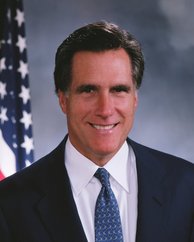Do Losing Presidential Candidates “Step Aside?”
Mitt Romney told America this weekend that he would not run for president a third time in 2016; was his rationale persuasive?

Media reports in recent weeks have indicated notable Republican donors are sending out feelers for another Romney bid in two years.
The former Massachusetts governor addressed this issue and avoided the usual murky language of politicians who are seriously considering a run for office, such as “I have no plans to run for president at this time” or “I am not currently seeking my party’s nomination.”
Instead, the 2012 GOP nominee said this:
“I’m not running for president. I think by and large people who lose a presidential race, well, they step aside.”
The first sentence is direct and Romney’s relatively low profile over the last year, compared to other rumored 2016 GOPers (like officeholders Rand Paul, Scott Walker etc.) suggests he is being truthful, even though a more definitive answer would have been, “I will never run for president again.”
When deconstructing the second sentence – that losing candidates ‘step aside’ – Romney’s rationale for not running in two years is accurate if he is specifically talking about presidential nominees: since World War II, there have been nearly two-dozen presidential hopefuls who did run for president again for a second (or third) time – including Romney himself.
However, only a small handful of unsuccessful major party nominees have suited up for another run in a subsequent cycle.
Since the birth of the modern two-party system in 1828, four have done so successfully on their second try: Democrat Andrew Jackson (1824, 1828), Whig William Harrison (1836, 1840), Democrat Grover Cleveland (1888, 1892 – after winning in 1884), and Republican Richard Nixon (1960, 1968).
Others have failed as a multiple cycle nominee such as Henry Clay (1824, 1844), Democrat William Jennings Bryan (1896, 1900, 1908), Republican Thomas Dewey (1944, 1948), and Democrat Adlai Stevenson (1952, 1956).
(Democrat Martin Van Buren also followed up his 1840 loss to William Harrison with an 1848 run as the Free Soil nominee).
Many others have lost presidential bids – falling short of winning their party’s nomination or otherwise – only to come back to campaign again in subsequent cycles.
The list of names from World War II on is significant including Republicans Wendell Willkie, Harold Stassen, Ronald Reagan, George H.W. Bush, Bob Dole, Pat Buchanan, Steve Forbes, Lamar Alexander, John McCain, Ron Paul, and Mitt Romney and Democrats Hubert Humphrey, George McGovern, Eugene McCarthy, George Wallace, Scoop Jackson, Jerry Brown, Jesse Jackson, Dick Gephardt, Al Gore, Joe Biden, Dennis Kucinich, and John Edwards.
Another Democrat seemingly poised to be added to that list in 2016 is Hillary Clinton, though if and when the former Secretary of State and 2008 presidential candidate will make such an announcement is the million dollar question this cycle.
And whether Romney will go down in the books in 2016 as a Bob Dole (and not run), a Wendell Willkie (run again and fail), or a Thomas Dewey (run again and claim the GOP nod for a second straight cycle) will also be quite evident in the near future.
Follow Smart Politics on Twitter.
